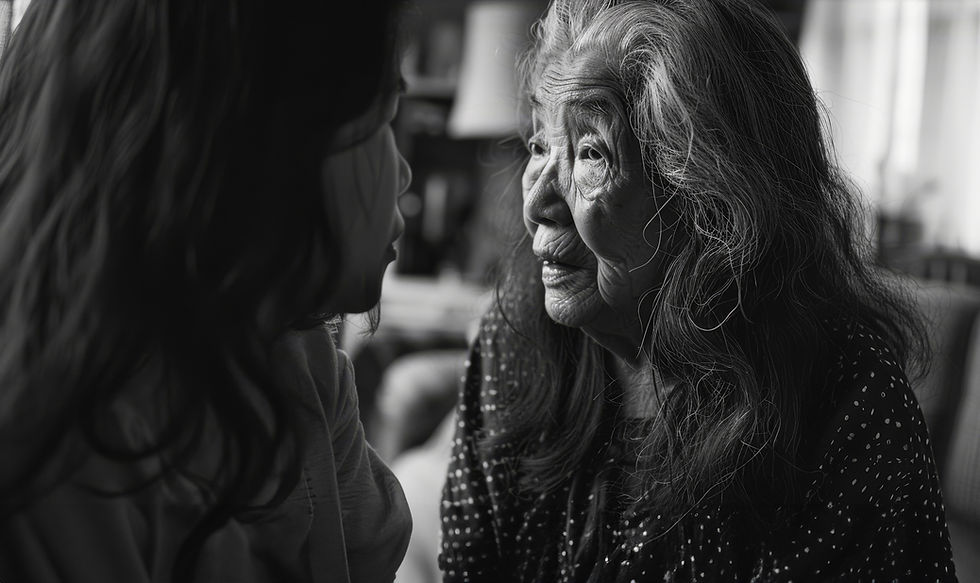Supporting Seniors Through Grief and Loss: A Compassionate Approach
- Kris Aiken

- Sep 2
- 3 min read

Grief is a universal human experience, yet for seniors, it often carries unique challenges. The loss of a partner, a close friend, or even a beloved pet can deeply impact a senior’s sense of identity, routine, and well-being. For caregivers and families, knowing how to offer meaningful support during these times is essential. By approaching grief with compassion and sensitivity, we can help seniors navigate loss while maintaining dignity, resilience, and hope.
Understanding How Seniors Experience Grief
Grief in later life is often complicated by factors such as declining health, mobility limitations, or a reduced social network. Unlike younger adults, who may have multiple roles and distractions, seniors may feel the loss more acutely because it disrupts the daily rhythms of companionship and care.
Loss of a spouse or partner can feel like losing a lifelong anchor, triggering loneliness and anxiety about the future.
Loss of a peer or friend may remind seniors of their own mortality, creating feelings of isolation.
Loss of a pet—a constant source of unconditional love—can leave a profound emptiness, particularly for those living alone.
It’s important for caregivers to recognize that grief may not always appear as sadness. Seniors may show it through physical symptoms, withdrawal from activities, irritability, or changes in appetite and sleep.
Ways Caregivers and Families Can Offer Support
1. Listen with Patience and Presence
Sometimes, the most powerful act of support is simply being there. Seniors may need to share memories, repeat stories, or express feelings of regret or fear. Listening without rushing, interrupting, or offering quick solutions communicates that their grief is valid and heard.
2. Encourage Healthy Routines
Grief can disrupt sleep, appetite, and daily self-care. Caregivers can gently support seniors by helping maintain regular meals, encouraging light physical activity, and ensuring they take medications as prescribed. Routine provides structure and can ease feelings of disorientation.
3. Foster Social Connection
Loneliness intensifies grief. Encourage seniors to stay connected with family, peers, and community groups. For those who cannot leave home easily, virtual visits or phone calls can make a significant difference. Faith groups, bereavement circles, and senior centers often provide meaningful social outlets.
4. Create Opportunities for Remembrance
Honoring the memory of a loved one can bring comfort. Caregivers can help seniors create rituals such as looking through photo albums, planting a tree, or writing letters to the person or pet they’ve lost. These acts validate grief while reinforcing positive memories.
5. Support Professional Help When Needed
If grief leads to persistent depression, hopelessness, or withdrawal, professional support may be necessary. Encourage seniors to connect with grief counselors, social workers, or mental health professionals who specialize in elder care. Sometimes, having a safe space outside of family can help them process emotions more freely.
The Role of Empathy in Care
Every senior’s grief journey is unique, and there is no timeline for “moving on.” Caregivers and families should approach with empathy rather than pressure, recognizing that grief may resurface during anniversaries, holidays, or milestones. Small gestures—like remembering special dates or offering companionship on difficult days—show seniors that they are not alone.
Caring for the Caregivers
It’s equally important for family members and professional caregivers to acknowledge their own emotional needs. Supporting someone through grief can be emotionally taxing. Building in time for rest, reflection, and self-care ensures caregivers can continue to provide compassionate support without burning out.
Building a Culture of Compassion
At The Care Company, we believe that caring for seniors means more than meeting physical needs—it means supporting the whole person, especially through life’s most difficult moments. By fostering open conversations, respecting emotions, and creating a safe space for healing, families and caregivers can help seniors navigate grief while preserving their sense of dignity and belonging.
Final Thoughts
Grief and loss are unavoidable parts of aging, but they don’t have to be endured in isolation. With compassion, presence, and the right resources, seniors can move through loss while still finding connection, meaning, and joy in their daily lives. Whether it’s through listening, building routines, or creating rituals of remembrance, every act of kindness makes a difference.



Comments